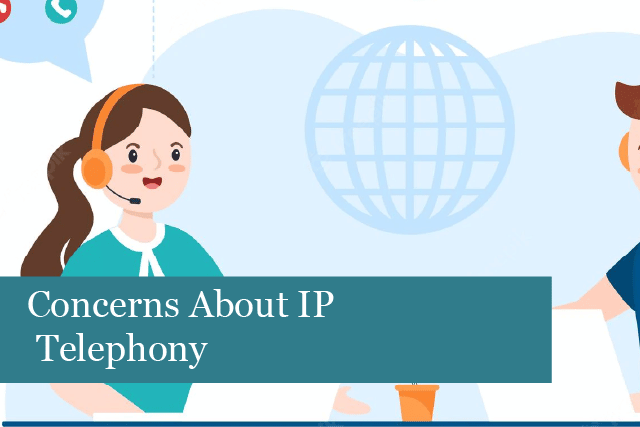
Technology continues to change at lightning speeds, making it challenging to stay up to date on the latest changes. However, businesses are forced to deal with technology changes much faster than their clients and customers. One of the latest tech challenges for many companies is IP telephony.
IP telephony is an IP-based voice communication solution based on trusted frameworks, including Ethernet Connectivity, SoGEA, and FTTP. IP telephony is considered the future of communications for companies; however, many businesses are worried this new technology may not stay around long enough to adopt. In addition, many organisations have some reservations about IP-based tech.
In this article, we go over what IP telephony is and the most common concerns with this technology.
What is IP Telephony?
IP telephony (also referred to as Internet Protocol telephony), is a general term that refers to technologies, products, and services that use Internet Protocol packet-switched connections for voice calling, voicemail, video calling, video conferencing, faxing, and instant messaging.
These forms of communication have been carried over circuit-switched connections of the PSTN (public-switched telephone network). However, on the Internet, these communications are formed into packets of data and sent across shared lines to avoid the costs (tolls) of public-switched telephone networks.
On the other hand, IP telephony converts voice calls and other communications into digital signals. These signals travel through IP networks (including the Internet) as data packets using IP packet-switched connections. This has traditionally been referred to as VoIP (voice over IP).
VOIP isn’t a new technology; it was first introduced in 1991, with Microsoft and Radvision standardising VOIP in 1995.
What’s the Difference Between IP Telephony & VOIP?
There are some differences between IP telephony and VOIP, though these two terms can overlap. They’re sometimes used synonymously, but this is not correct.
- IP telephony: this is a general term that applies to a broad range of technologies (as described earlier).
- VOIP: is a specific term that applies to standardised tech that provides voice-based services (calling & voicemail, for instance).
Concerns with IP Telephony
When new technologies are promoted, they usually come with some concerns, especially for businesses that try to adopt them. The same is true for IP telephony. Some companies have some major worries about IP telephony and making major changes to the systems they’re already using. In this section, we’ll go over some of the main concerns businesses are dealing with in regard to this new technology.
- The Old Technology Still Works, So Why Change It?
Old technology is reliable, and it still works, so why change it? The main issue here is that in December 2025, BT will shut off copper-based landline phones and urge everyone to change to new IP-based technologies.
Some companies have already changed over to the new IP telephony technology. However, about 30% of businesses have not even started to review alternative telephony services. As a result, they could find themselves caught with no working service at all once the cutoff date hits.
It’s best to adopt the new IP telephony services now rather than wait until it’s too late.
- Too Challenging to Change
Changing from an older system to a newer one can take time and resources. It can happen when adopting new technologies. However, many businesses are using this as an excuse not to change. They are worried that changing to IP telephony technology will be too challenging and too costly. However, that’s not the case.
For one thing, it’s not necessary to install new lines with IP telephony. The technology works on existing Internet connections. In addition, the system replaces ISDN, which means your business will have more bandwidth for the rest of the company’s Internet needs. These can be optimised to take better advantage of company resources.
Finally, IP telephony is scalable and can be a great choice for seasonal companies. That means a business has the ability to scale the tech up or down as needed at any time during the year. This is another way to optimise company resources and reduce costs.
- Poor Quality
Many companies and individuals have experienced VOIP technologies through apps such as Skype and other chat software. These are great tools for managing personal use; however, they don’t always do well when it comes to dealing with many calls going in or out at one time. If there are too many calls, they may suffer from poor quality, making communication challenging at best.
On the other hand, voice IP calls (not VOIP) have been developed to handle large data packets that come through at any one time, even when there are many calls. Voice IP calls, therefore, don’t experience the poor quality of the older technology. Instead, these calls are clear and high quality. They also provide instant connectivity and ease of access/use.
- Lack of Trust
Another common concern businesses may have with IP telephony is that the technology can’t be trusted. This is usually based on company experience with new technologies. It’s true that new technology can be buggy and have all sorts of problems. However, IP telephony is different.
IP telephony has already been thoroughly tested and vetted. It’s already in use all across the UK, and organisations that have adopted the technology find it more reliable and that IP telephony technologies are faster, clearer, and more reliable.
- IP Telephony is Expensive
Finally, many companies fear that IP telephony technology is too expensive. However, it’s usually more affordable than ISDN copper lines that have been used for traditional telephony services in the past.
What’s more, there’s no need to lease copper lines and pay a monthly fee to use them. So, moving to an IP-based solution is a great way to save money. The network is easier and faster to install, you can obtain service packages from your provider, and not much training is needed to run these new forms of communication.
Summing It Up
Many organisations have concerns and fears about moving to new technologies such as IP-based communications. However, IP telephony has been found to be a cost-effective service that offers higher-quality communications that are easy to use.
We’ve just shown that these main concerns about IP telephony technology are baseless. So, what’s holding your company back from adopting this communication technology?
Recommended Posts

Are you making the most of your Microsoft 365 licensing?
4th July 2025


